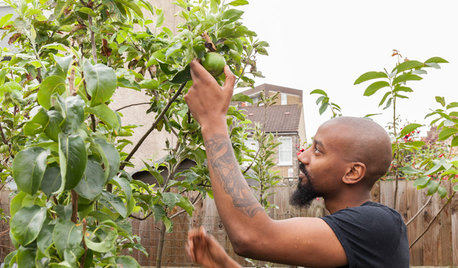Toomuchglass got her allergy thread hijacked, (sorry!), so I thought I'd start a new one. I will copy and paste the previous posts below. I don't intend to try to sway anyone into feeding raw, but there is so much misinformation about it that I think it's important to hear from those with direct experience.
-----------------------------------------------------
RE: Seasonal Allergies - UH OH !!
* Posted by weed30 (My Page) on
Fri, Sep 8, 06 at 21:52
One of my dogs, Maggie, was on steroids 9 months of the year for allergies. (Spring/Summer/Fall) I switched to a raw diet, and within a month she stopped itching. That was about 8 years ago, and she's not had a problem since.
RE: Seasonal Allergies - UH OH !!
* Posted by nancy_in_mich (My Page) on
Sat, Sep 9, 06 at 1:09
I went to a holistic vet who put Meg on a predigested dog food that cost a lot and that she eventually started vomiting.
I gave up on that and I just used benedryl and kept her completely away from wheat, corn, beets, and potatoes - her four food allergies. I would give omega 3 vitamins too. I just couldn't do the raw thing, but I did give her a lot of real food (cooked) and the very best and freshest dry food money could buy. It helped. Look for food with odd ingredients like salmon and sweet potato or duck. Dogs become allergic to foods like grains (which made up none or very little of a real canine diet), then when you add the seasonal allergy season, their bodies cannot take the extra irritation and before you know it, they are on steroids. Meg was very uncomfortable if she had to take steroids, so I was careful to regulate her diet allergies in the summer and hope the Benedryl would do the trick once her inhallant allergies kicked in come August. She didn't need steroids the last few years. Try raw, like weed does and I bet it will go away. If this is not for you, try getting a blood test to ID the food allergies and do your best to keep her away from these foods and she may be able to handle allergy season better next year.
o
RE: Seasonal Allergies - UH OH !!
* Posted by weed30 (My Page) on
Sat, Sep 9, 06 at 8:24
I want to add that I didn't switch to raw *because* of Maggie's allergies. I just stumbled across information on feeding raw, and it made perfect sense to me, so I switched. The end of her allergies were a wonderful benefit. Taco also had issues that went away. She used to throw up a fair amount, and also had horrible gas. She still lets one rip occassionally, but not even close to how she used to be.
o
RE: Seasonal Allergies - UH OH !!
* Posted by girlwithaspirin (My Page) on
Sat, Sep 9, 06 at 10:53
Wow, great to hear so many raw success stories. It eliminated Lemon's allergies, too. From spring to fall, she used to have such weepy, goopy eyes and itchy skin. All gone!
RE: Seasonal Allergies - UH OH !!
* Posted by quirkyquercus (My Page) on
Sat, Sep 9, 06 at 13:54
Had a discussion with the vet yesterday about the raw diets. She said the die hard raw diet feeders are constantly bringing their dogs in with parasites and the bacteria and virus that may be present in raw meat are not a good idea to have with house pets. True in the wild.... but in the house, no thanks. She felt very strongly opposed to feeding raw and in fact said she'd rather have patients eating the cheapest grocery store food than raw.
RE: Seasonal Allergies - UH OH !!
* Posted by weed30 (My Page) on
Sat, Sep 9, 06 at 14:57
I have been feeding raw for 8 or so years, I personally know many who feed raw, and used to participate on a board with thousands of raw feeders from all over the world. Nobody I personally know has had any issues, and I can't recall any significant incidence of posts on the raw board about such problems. (In fact I can't remember any.)
Dogs and cats lick residual poop off of their butts. Some of them eat poop that does not belong to them. They eat their own vomit. They lick floors that are full of lord knows what from the bottoms of peoples' shoes. I don't see fresh raw food being of particular worry.
Did she have a big display of dog and cat food in the waiting area?
RE: Seasonal Allergies - UH OH !!
* Posted by girlwithaspirin (My Page) on
Sat, Sep 9, 06 at 15:35
Did she have a big display of dog and cat food in the waiting area?
That's what I was about to ask. ;)
I find it pretty horrific that a vet would want her patients eating crappy corn-filled food over quality raw food. The vast majority of vets don't buy into raw because 1) their education includes nothing about nutrition, and 2) they're selling Science Diet or some other kibble.
Like weed, I've never heard of a single problem like your vet describes. Sounds like she's a bit of an alarmist.
RE: Seasonal Allergies - UH OH !!
* Posted by quirkyquercus (My Page) on
Sat, Sep 9, 06 at 22:28
Oh come on. They sell sci-diet but this was not a sales pitch. She even said she feeds her own pets Eukanuba.
Problem with raw food is it may contain things like salmonella, e-coli and others. When the food is cooked thoroughly it is safe for humans to eat. The "licking of residual poop" is a good example of how this could be a problem with spreading bacteria with raw diets. The example of licking the floor... the floor may be a dirty place but may not be a dirty as we think. If it's dry and there's no food on it, it's not the most ideal environment for pathogens.
None the less, the concern was not for the safety of the pet, but instead for the safety of the humans that live with the pet. Particularly, sensitive groups such as children who are not too hygenic.
RE: Seasonal Allergies - UH OH !!
* Posted by sue36 (My Page) on
Sat, Sep 9, 06 at 22:39
Just to chime in on the raw diet thing...my sister feeds her dogs a raw diet. She had had 3 large dogs live to be 17-18. She feeds her cats Wellness (which is what I feed my cat as well).
RE: Seasonal Allergies - UH OH !!
* Posted by weed30 (My Page) on
Sat, Sep 9, 06 at 22:44
Not a sales pitch, maybe...maybe not. How much money do you suppose pet food manufacturers dump into the vetinary world? Lots, I can assure you. And so what if she feeds her pets Eukanuba. One of my doctors smokes. Both are lucky that they have access to free medical care.
The raw food is not for humans to eat, it's for pets to eat, so I don't understand your comment about that. As far as the safety of the humans living with pets that are fed a raw diet, as long as the food preparer uses basic safe food handling techniques, there is no problem. Wash the food bowls and wash the cutting board used to prepare the food. Just like when you make food for humans.
Frankly, I am MUCH more concerned about being infected with a virus or bacteria from a child than any pet. Little kids are chock full of nasty bugs that are highly contagious, and you're right, they are totally unhygenic, so that icky junk hanging out of their noses is most likely on their chubby little hands, their arms, their knees....ick! And for some reason a certain group of parents insist on having their infectious babe "Give Ms. Weed a kiss!" ACK!
RE: Seasonal Allergies - UH OH !!
* Posted by girlwithaspirin (My Page) on
Sun, Sep 10, 06 at 3:17
I guess I don't understand the concern for humans, either, and I haven't heard of any issues. I mean, I cook chicken and steak for myself, and I know to wash my hands and any boards or utensils that come in contact with it. What makes the raw canine diet any different? It goes from a baggie into the bowl, and the bowl is washed after every meal.
If there's someone in the house who's immune-compromised, you'd have to be extra careful with *any* raw food, canine or otherwise.
















weed30 St. LouisOriginal Author
cindyx
Related Discussions
any other raw feeders out there?
Q
Raw diets question
Q
Just a reminder what not to feed you furry family!
Q
What do you feed a dog prone to allergies?
Q
toomuchglass
weed30 St. LouisOriginal Author
sally2_gw
weed30 St. LouisOriginal Author
weed30 St. LouisOriginal Author
Meghane
weed30 St. LouisOriginal Author
Meghane
jrdown
Gina_W
weed30 St. LouisOriginal Author
Gina_W
Meghane
Gina_W
emmhip
cindyx
Gina_W
Meghane
booboo60
clt3
weed30 St. LouisOriginal Author
weed30 St. LouisOriginal Author
suzieque
cindyx
cynthia_gw
weed30 St. LouisOriginal Author
cindyx
Gina_W
cynthia_gw
cindyx
toomuchglass
weed30 St. LouisOriginal Author
cindyx
deniseandspike